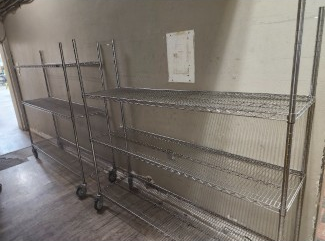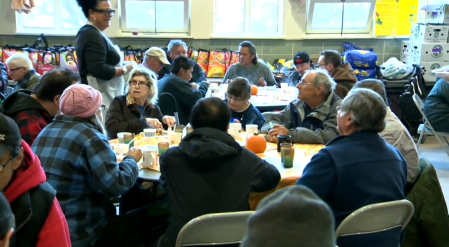The demand on non-profit organizations continues to rise, but donations are struggling to match the pace.

Aaron Scarff, volunteer co-ordinator with Agape Table — one of Winnipeg’s largest food banks — said the charity fed 4,162 people in the span of five days last week, leaving its shelves bare.

“Serving 4,000 of anything is a lot, right? That’s 4,000 granola bars, 4,000 sandwiches, 4,000 soups,” he said, adding that pre-pandemic, about 250 to 350 meals were supplied a day.
Now the average is inching closer to 1,000.
“We’re not there yet, but we can see that’s kind of the way things are trending,” he said.
The climbing demands have left the organization with pressing needs.
“There’s an absolute urgent need for anything that can help us with bagging lunches — anything from yogurt, granola bars, cheese, spoons, even the bags that we serve them in,” Scarff said.
- Quebec hospital uses virtual reality to help with nurse shortage
- Toronto byelection mirrors choice for voters in next federal vote: Trudeau
- Canada’s human rights profiles for 80 countries haven’t been updated in 5 years: watchdog
- Stifling school: Good for ‘morale’ to be let out early, says N.B. student
Basic hygiene items are also needed, he said, like deodorant, toothbrushes and hair wash products.
A list of Agape Table’s needs and how to donate can be found at AgapeTable.ca/give.
A report from the Salvation Army Thrift Store shows that donations to its locations are also lagging behind climbing needs.
Ted Troughton, managing director of the Salvation Army Thrift Store’s national recycling operations, says that in Winnipeg, thrift store sales exceed donations by about 13 per cent.
“And really, we’re getting lots of donations, but the demand has become so much higher. New faces are coming in and saying, ‘I need to make my dollar go a little bit further, let me check out this thrift store,'” he said.
Troughton noted that the disparity isn’t about decreasing donations, which he said there are still lots of, it is purely demand, particularly for household items, which is a little bit of a newer demand.
“It’s a different situation right now because … things get more expensive in retail stores, because the cost of everything was going up,” he said.
That’s why thrift stores are important, he said, as they bring affordable options to people. In the Sally Ann’s case, thrift sales also help support community programs.
“The work that we do is really to support the work of the Salvation Army and the social services that they provide in over 400 communities across Canada, especially in the Winnipeg market where they’re there for those people that are the most vulnerable and the most in need,” Troughton said.
He encourages people to check their closets, basements, kitchen cupboards, garages, storage lockers — and anywhere else they can think of — for whatever is collecting dust in their home and might help someone out.
Go to ThriftStore.ca for drop-off locations.









Comments